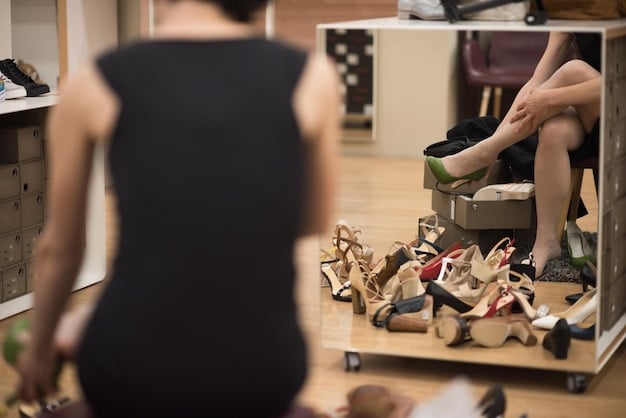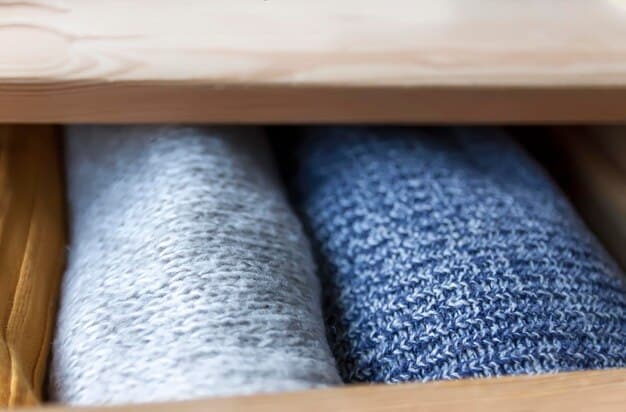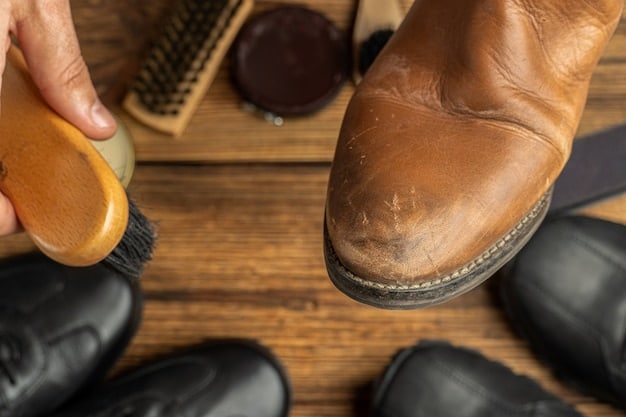How to Prevent Shoe Odor: Practical Tips for German Climates

Advertisements
Preventing shoe odor in German climates involves a combination of proper shoe hygiene, moisture management, and the use of deodorizing products; this guide provides practical tips tailored to combat shoe odor effectively.
Tired of the persistent stink emanating from your shoes? In the damp and varied climate of Germany, how to prevent shoe odor: practical tips for German climates becomes more than just a matter of hygiene – it’s a necessity for comfort and confidence.
Advertisements
Understanding Why Shoe Odor Occurs
Shoe odor is a common problem, but understanding the root causes can help you tackle it effectively. Several factors contribute to that unpleasant smell, and addressing them is key to keeping your shoes fresh.
The Role of Sweat and Bacteria
Sweat is the primary culprit behind shoe odor. Your feet have more sweat glands than any other part of your body, and when you wear shoes, especially for extended periods, that sweat becomes trapped. Bacteria thrive in this warm, moist environment, breaking down the sweat and producing foul-smelling compounds.
Advertisements
The Impact of German Climate
Germany’s climate, characterized by damp winters and humid summers, exacerbates the problem. High humidity levels mean that sweat doesn’t evaporate as quickly, creating an ideal breeding ground for bacteria. Furthermore, enclosed shoes worn during colder months restrict airflow, trapping moisture and odors.
To better understand this, consider these factors:
- Seasonal Changes: Adjust your shoe care routine based on the season. Use breathable materials during summer and focus on drying in winter.
- Footwear Type: Certain types of shoes, like synthetic materials, trap more moisture than leather or canvas.
- Activity Level: If you’re physically active, your feet will sweat more, requiring more frequent cleaning and deodorizing.
Ultimately, recognizing how sweat, bacteria, and the German climate interact is essential for preventing shoe odor. By addressing these factors, you can take proactive steps to keep your footwear smelling fresh.
Daily Habits to Minimize Shoe Odor
Establishing daily habits is crucial for preventing shoe odor. These practices are simple yet effective, and they can make a significant difference in maintaining fresh-smelling shoes. Here are some key daily habits to adopt:
Wear Breathable Socks
The type of socks you wear plays a significant role in preventing shoe odor. Opt for breathable materials like cotton, wool, or synthetic blends designed to wick away moisture. Avoid nylon or other non-breathable fabrics that trap sweat against your skin.
Alternate Shoes Daily
Wearing the same pair of shoes day after day doesn’t give them a chance to dry out completely. Alternating between pairs allows each one to air out, reducing moisture buildup and preventing bacteria from thriving. Consider having at least two pairs of your everyday shoes to rotate.

In conclusion, consider these tips:
- Regularly Change Socks: Change your socks at least once a day, or more often if you’re particularly active.
- Air Out Shoes: After each wear, let your shoes air out in a well-ventilated area to dry.
- Use Shoe Trees: Shoe trees help maintain the shape of your shoes and absorb moisture, further reducing odor.
By incorporating these daily habits into your routine, you can significantly minimize shoe odor and keep your footwear smelling fresh.
Effective Shoe Cleaning Techniques
Regularly cleaning your shoes is essential for removing bacteria and odor-causing substances. However, different types of shoes require different cleaning techniques. Follow these guidelines for effective shoe cleaning:
Cleaning Leather Shoes
Leather shoes require delicate care. Start by wiping them down with a damp cloth to remove surface dirt. For deeper cleaning, use a leather cleaner and conditioner to keep the leather supple and prevent cracking. Always allow leather shoes to air dry away from direct heat.
Cleaning Fabric Shoes
Fabric shoes, such as sneakers or canvas shoes, can often be machine washed. Remove the laces and insoles before washing, and place the shoes in a laundry bag to protect them. Use a mild detergent and a gentle cycle. Air dry the shoes completely before wearing them again.

For comprehensive cleaning, remember to:
- Clean Insoles: Insoles are a major source of odor. Remove them and wash them separately, or replace them regularly.
- Disinfect Interiors: Use a disinfectant spray to kill bacteria inside the shoes.
- Dry Thoroughly: Ensure shoes are completely dry before wearing them again to prevent moisture buildup.
By knowing the correct cleaning techniques for various materials, you can keep your shoes fresh and extend their lifespan.
Natural Remedies for Shoe Odor
If you prefer natural solutions, several household items can help combat shoe odor. These remedies are inexpensive, eco-friendly, and effective at absorbing odors and killing bacteria.
Baking Soda
Baking soda is a natural deodorizer. Sprinkle a generous amount of baking soda into your shoes and let it sit overnight. In the morning, shake out the excess powder. Baking soda absorbs moisture and neutralizes odors. Repeat this process regularly to maintain freshness.
Tea Tree Oil
Tea tree oil has antibacterial and antifungal properties. Add a few drops of tea tree oil to your shoes or to a cotton ball and place it inside. The oil helps kill odor-causing bacteria and leaves a fresh scent. Use tea tree oil sparingly, as it can be potent.
Likewise, also consider
- Vinegar Solution: Mix equal parts of white vinegar and water in a spray bottle. Lightly spray the inside of your shoes and let them air dry.
- Citrus Peels: Place fresh citrus peels (such as lemon, orange, or grapefruit) inside your shoes overnight. The peels absorb odors and leave a pleasant fragrance.
- Activated Charcoal: Place activated charcoal inserts or pouches in your shoes to absorb moisture and odors.
Each of one of these options are very effective on getting rid of bad odors coming from your shoes. Use any of these and prevent any bad aroma coming off of your shoes.
Using Deodorizing Products Effectively
When natural remedies are not enough, using commercially available deodorizing products can provide extra help. Sprays, powders, and inserts are designed to combat shoe odor effectively. However, applying them correctly is essential to get the best results.
Shoe Deodorizing Sprays
Shoe deodorizing sprays are easy to use and provide instant freshness. Spray the inside of your shoes after each wear, focusing on the toe and heel areas where odor tends to concentrate. Allow the spray to dry completely before wearing the shoes.
Shoe Odor Powders
Shoe odor powders work by absorbing moisture and neutralizing odors. Sprinkle the powder inside your shoes before each wear, especially if you know you’ll be sweating a lot. Tap out the excess powder after wearing the shoes.
As an added, consider:
- Shoe Inserts: Shoe inserts infused with odor-absorbing materials like activated charcoal or cedarwood can provide long-lasting freshness.
- UV Shoe Sanitizers: UV shoe sanitizers use ultraviolet light to kill bacteria and fungi inside shoes, reducing odor.
- Fabric Sprays: For shoe liners that are not removable, use a generic odor eliminator fabric spray.
By choosing the right solutions, you can ensure your shoes smell fresh and clean.
Maintaining Shoe Hygiene in German Weather Conditions
The German climate, with its damp winters and humid summers, presents specific challenges for maintaining shoe hygiene. Adjusting your routine to suit these conditions can prevent shoe odor effectively.
Dealing with Damp Winters
During the winter months, shoes are more likely to get wet from rain and snow. Always dry your shoes thoroughly after exposure to moisture. Use a shoe dryer or stuff them with newspaper to absorb excess water. Avoid placing shoes near direct heat sources, as this can damage the materials.
Handling Humid Summers
In the summer, high humidity levels increase sweating and create a breeding ground for bacteria. Wear breathable shoes and socks whenever possible. Use absorbent shoe inserts to wick away moisture. Regularly clean and disinfect your shoes to prevent odor buildup.
And also, remember to:
- Use Weather-Appropriate Footwear: Wear waterproof shoes and boots during wet weather to protect your feet from moisture.
- Rotate Shoes Frequently: Give your shoes ample time to dry between wears, especially during humid periods.
- Store Shoes Properly: Store shoes in a well-ventilated area to prevent moisture accumulation.
By tailoring your shoe care practices to German weather conditions, you can stop the aroma and keep your footwear fresh and comfortable year-round.
| Key Point | Brief Description |
|---|---|
| 🧦 Breathable Socks | Wear cotton or wool socks to wick away moisture. |
| 🔄 Shoe Rotation | Alternate shoes daily to allow them to dry out fully. |
| 🧼 Regular Cleaning | Clean shoes regularly to remove bacteria and odors. |
| 🌱 Natural Remedies | Use baking soda or tea tree oil to deodorize naturally. |
Frequently Asked Questions
The smell might persist if the shoes aren’t dried properly, allowing bacteria to continue thriving. Ensure thorough drying and consider using disinfectant sprays to kill lingering bacteria.
Ideally, clean your shoes every 2-4 weeks, depending on usage. For high-use shoes, cleaning every two weeks is recommended to prevent odor build-up and bacteria growth.
Avoid non-breathable synthetic materials like nylon or plastic, which trap moisture. Opt for leather, canvas, or breathable synthetic blends that allow air circulation and reduce sweat accumulation.
Yes, shoe inserts made with activated charcoal or cedarwood can effectively absorb moisture and neutralize odors. Replace them regularly to maintain their effectiveness and keep your shoes fresh.
Stuff wet shoes with newspaper or use a shoe dryer. Avoid direct heat, which can damage the materials. Ensure shoes are dried in a well-ventilated area to prevent mold and bacteria growth.
Conclusion
Combating shoe odor in the German climate requires a multifaceted approach, combining daily habits, effective cleaning techniques, natural remedies, and appropriate deodorizing products. By incorporating these strategies into your routine, you can keep your shoes fresh, comfortable, and odor-free year-round.